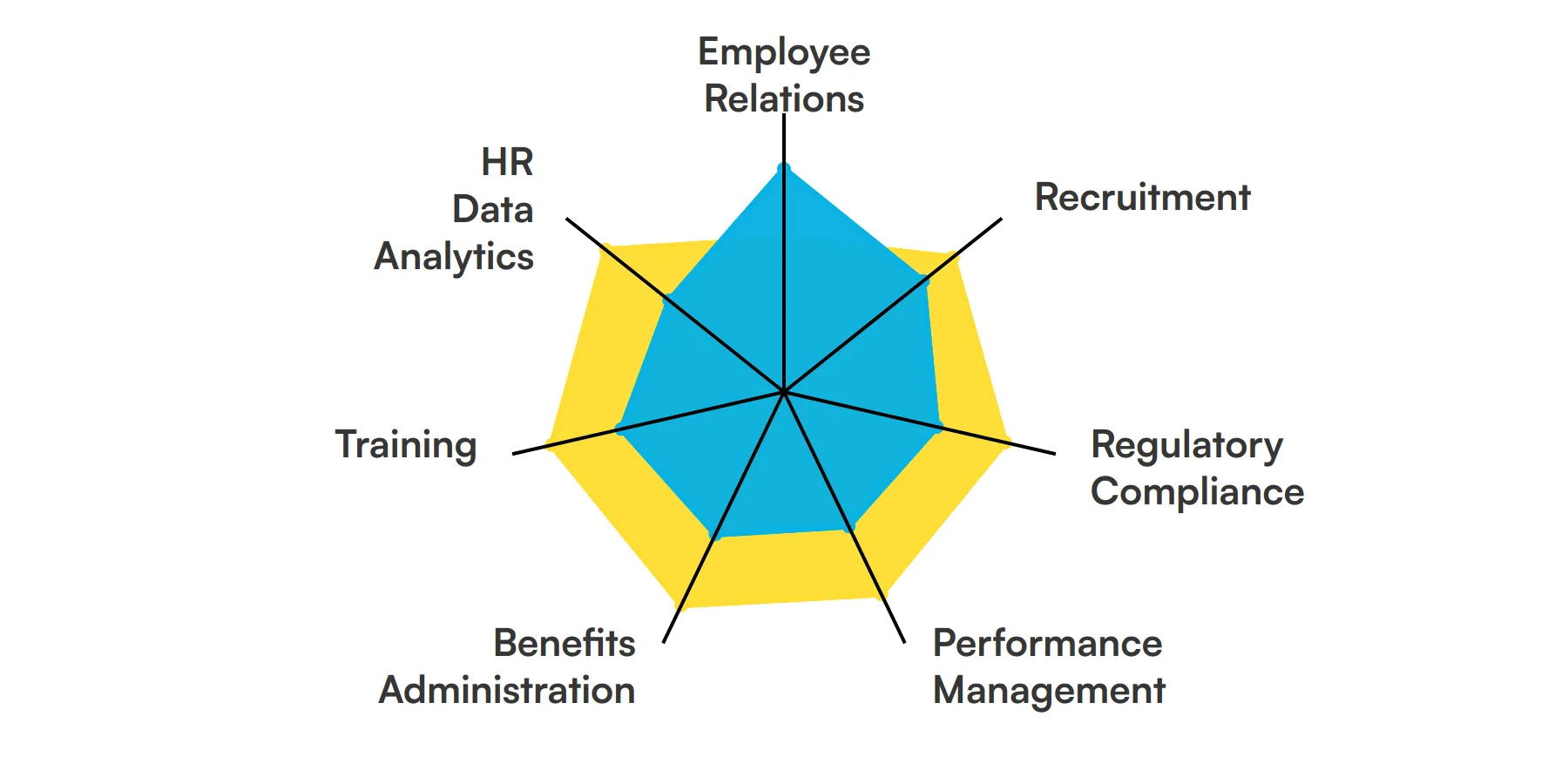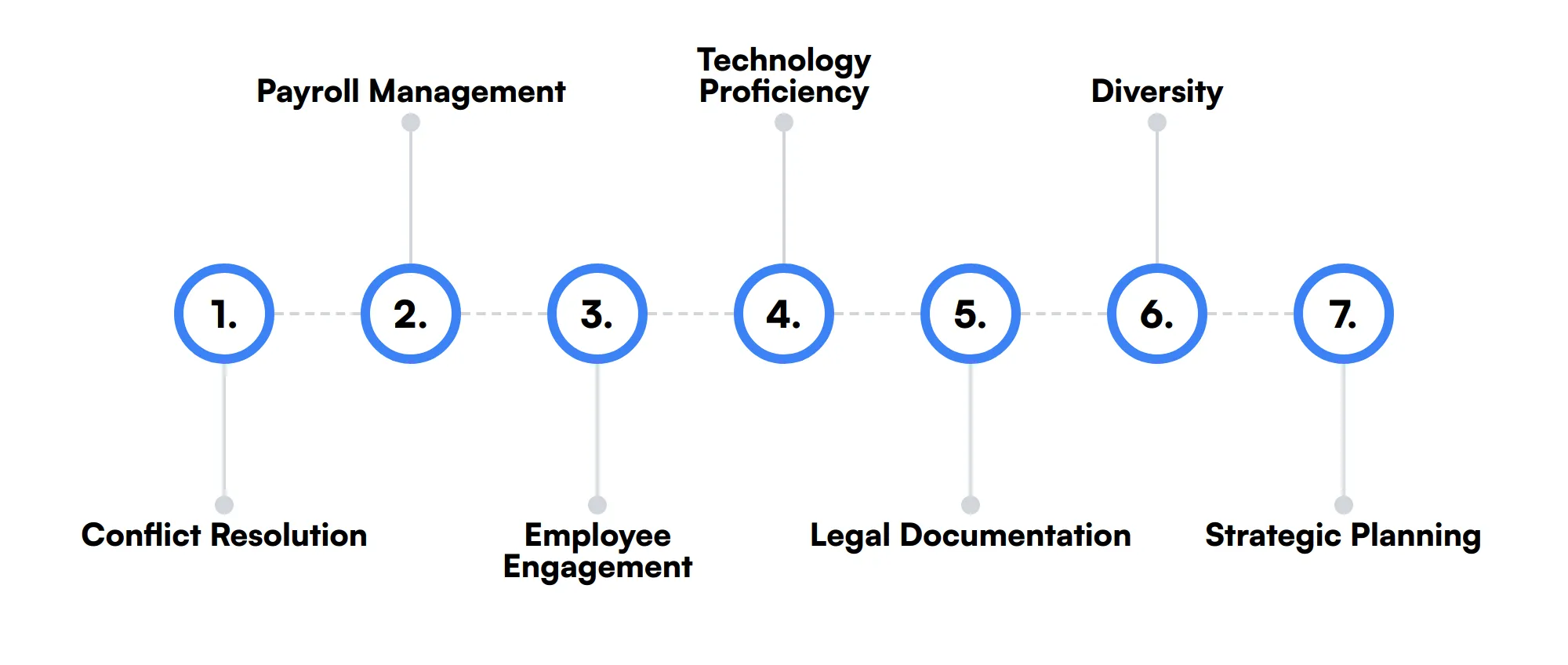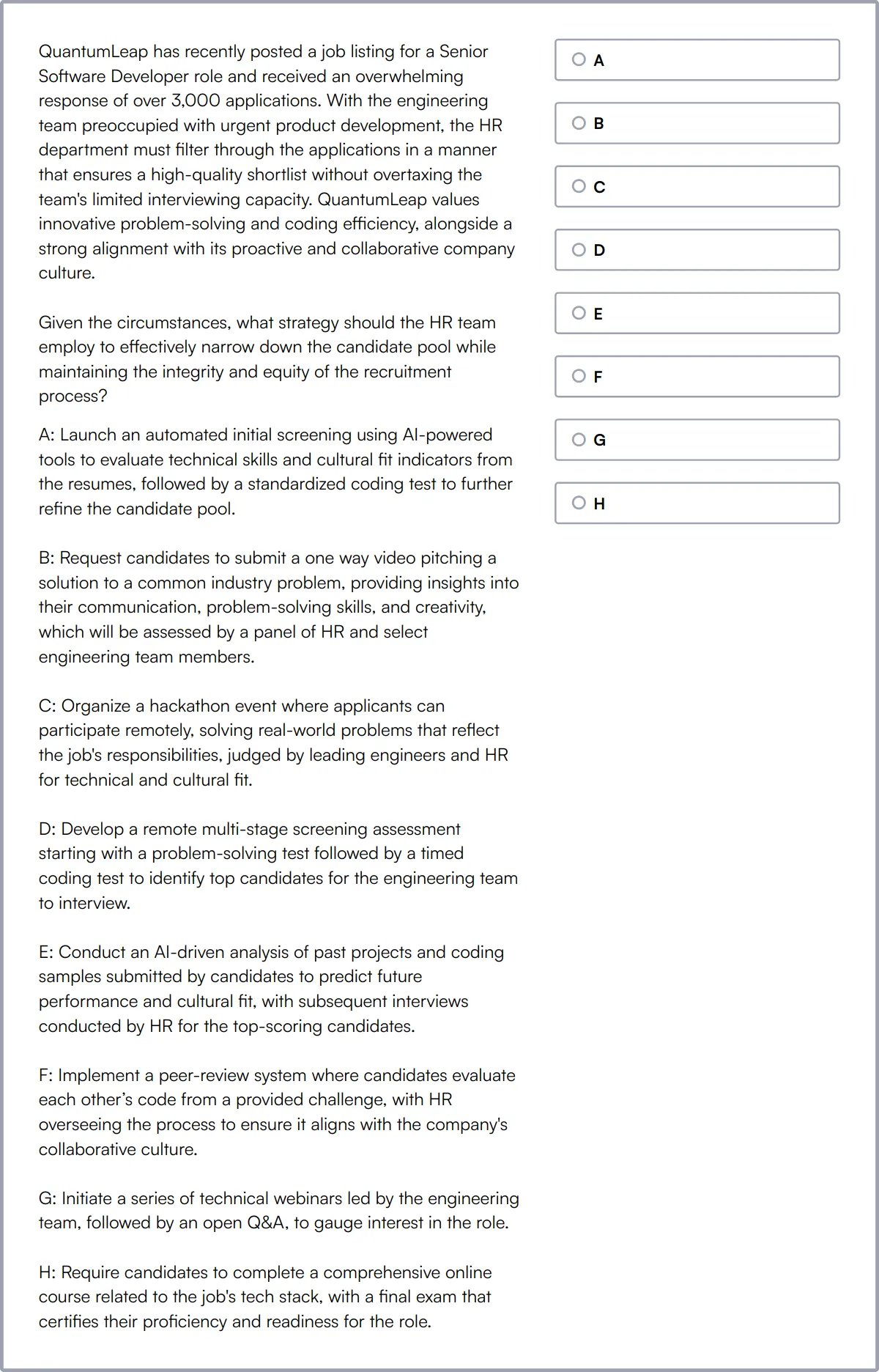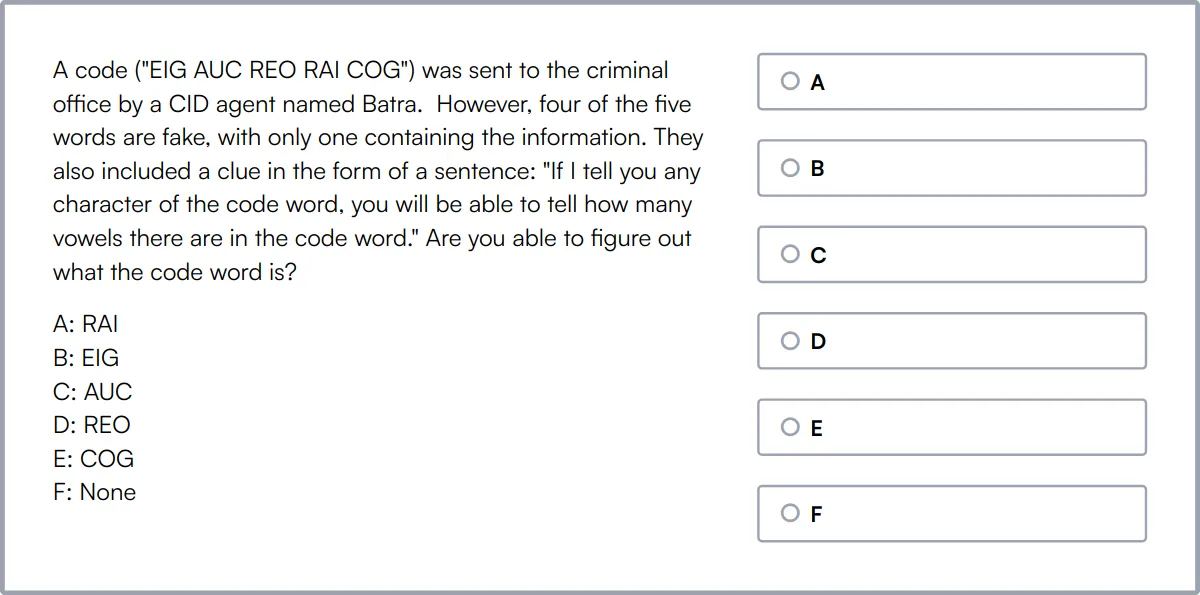HR Generalists play a key role in managing the day-to-day operations of the human resources department. They handle a variety of tasks, from recruitment and onboarding to employee relations and compliance, ensuring that the workplace runs smoothly and efficiently.
HR Generalist skills include knowledge of employment laws, proficiency in HR software, and strong interpersonal skills. These professionals must also be adept at problem-solving and have excellent organizational abilities.
Candidates can write these abilities in their resumes, but you can’t verify them without on-the-job HR Generalist skill tests.
In this post, we will explore 7 essential HR Generalist skills, 7 secondary skills and how to assess them so you can make informed hiring decisions.
Table of contents
7 fundamental HR Generalist skills and traits
The best skills for HR Generalists include Employee Relations, Recruitment & Onboarding, Regulatory Compliance, Performance Management, Benefits Administration, Training & Development and HR Data Analytics.
Let’s dive into the details by examining the 7 essential skills of a HR Generalist.

Employee Relations
An HR Generalist must navigate and manage the relationships between employees and the organization. This involves addressing grievances, mediating disputes, and fostering a positive work environment. Effective employee relations strategies are key to maintaining staff morale and productivity.
For more insights, check out our guide to writing a HR Generalist Job Description.
Recruitment & Onboarding
Recruiting the right talent and ensuring a smooth onboarding process are fundamental responsibilities of an HR Generalist. This includes crafting job descriptions, screening candidates, and facilitating introductions to company culture and processes.
Regulatory Compliance
HR Generalists must ensure that the company adheres to all relevant employment laws and regulations. This skill involves staying updated on legal changes, implementing policies, and training staff to mitigate legal risks.
Performance Management
This skill involves setting performance standards, conducting evaluations, and providing feedback. An HR Generalist uses performance management to align individual achievements with organizational goals, fostering professional growth and achievement.
Benefits Administration
Managing employee benefits is a key role for an HR Generalist. This includes negotiating with providers, administering benefits programs, and ensuring employees understand their benefits. Effective administration impacts employee satisfaction and retention.
Training & Development
HR Generalists are responsible for identifying training needs and developing programs that enhance employee skills and knowledge. This continuous education helps the workforce stay competitive and efficient.
HR Data Analytics
Analyzing HR data helps in making informed decisions about workforce management. An HR Generalist uses metrics and analytics to assess HR processes and improve areas like recruitment, retention, and employee performance.
Check out our guide for a comprehensive list of interview questions.
7 secondary HR Generalist skills and traits
The best skills for HR Generalists include Conflict Resolution, Payroll Management, Employee Engagement, Technology Proficiency, Legal Documentation, Diversity & Inclusion and Strategic Planning.
Let’s dive into the details by examining the 7 secondary skills of a HR Generalist.

Conflict Resolution
Resolving conflicts effectively ensures a harmonious workplace. HR Generalists use this skill to intervene in disputes and find amicable solutions that respect all parties' interests.
Payroll Management
Although often supported by specialized software, understanding payroll processes is important for HR Generalists to oversee accurate and timely salary payments and deductions.
Employee Engagement
Engaging employees through initiatives that boost morale and job satisfaction is a key task for HR Generalists. This includes organizing events, surveys, and feedback mechanisms.
Technology Proficiency
Proficiency in HRIS (Human Resources Information Systems) and other HR technologies is important for efficiency in managing information and automating routine tasks.
Legal Documentation
Drafting and maintaining accurate legal documents such as contracts, employee handbooks, and policy updates is a necessary skill for ensuring organizational compliance and protecting both the entity and its employees.
Diversity & Inclusion
Promoting a diverse and inclusive workplace is increasingly recognized as important. HR Generalists work to implement policies and practices that support a broad spectrum of employees.
Strategic Planning
HR Generalists contribute to the broader strategic planning of an organization by aligning HR strategies with business objectives. This involves workforce planning, succession planning, and resource allocation.
How to assess HR Generalist skills and traits
Assessing the skills and traits of an HR Generalist can be a nuanced process. While resumes and interviews provide some insights, they often fall short of painting a complete picture of a candidate's capabilities. To truly understand an HR Generalist's proficiency in areas like Employee Relations, Recruitment & Onboarding, Regulatory Compliance, Performance Management, Benefits Administration, Training & Development, and HR Data Analytics, a more structured approach is necessary.
Skills-based assessments offer a reliable way to evaluate these competencies. By using targeted tests, you can measure a candidate's practical knowledge and problem-solving abilities in real-world scenarios. Adaface assessments are designed to help you achieve this, offering a 2x improved quality of hires and an 85% reduction in screening time. These assessments can be tailored to focus on the specific skills and traits that are most relevant to your HR Generalist role.
Let’s look at how to assess HR Generalist skills with these 4 talent assessments.
HR Test
Our HR Test evaluates a candidate's ability to address common workplace challenges in staffing, aligning employee behavior with business goals, and utilizing HR software to provide comprehensive support to management and staff.
The test assesses their understanding of Human Resource Management Fundamentals, Talent Acquisition Fundamentals, Critical Thinking, Abstract Reasoning, Situational Judgement, Conflict Management, and Talent Pipeline Management.
Successful candidates demonstrate a strong grasp of HR principles, effective conflict resolution strategies, and the ability to think critically in various HR scenarios.

Talent Acquisition Test
Our Talent Acquisition Test measures a candidate's proficiency in sourcing, recruiting, and onboarding qualified individuals, as well as their skill in leveraging recruitment technologies and data analysis.
The test covers Logical Reasoning, Situational Judgement, Evaluation, Interviewing, Selection, Candidate Screening, Skills Assessment, Job Analysis, and Job Descriptions.
High-scoring candidates show expertise in identifying and attracting top talent, conducting effective interviews, and making informed hiring decisions based on data-driven insights.

GDPR Online Test
Our GDPR Online Test uses scenario-based MCQs to evaluate candidates on their understanding of GDPR regulations and best practices for data protection and privacy.
The test assesses knowledge in Data Privacy, Data Protection, Data Security, Data Breach, Data Processing, Consent Management, Data Retention, Data Subject Rights, Data Transfer, Data Controllers, and Data Processors.
Candidates who perform well demonstrate a thorough understanding of GDPR compliance, the ability to identify and mitigate data protection risks, and the skills to implement effective data privacy policies.
Data Analysis Test
Our Data Analysis Test assesses a candidate's ability to handle, modify, analyze, and interpret data using scenario-based MCQ questions.
The test covers Basics of data modelling, Basics of data analysis, Business analysis fundamentals, Data interpretation, Data queries and databases (SQL), Data operations, Data investigations, and Popular data tools (Excel).
Successful candidates demonstrate proficiency in analyzing data to find outcomes, detect anomalies, extract insights, and visualize data using charts and graphs.

Summary: The 7 key HR Generalist skills and how to test for them
| HR Generalist skill | How to assess them |
|---|---|
| 1. Employee Relations | Evaluate how well they manage and resolve workplace issues. |
| 2. Recruitment & Onboarding | Assess their ability to attract and integrate new talent. |
| 3. Regulatory Compliance | Check their knowledge of labor laws and adherence to regulations. |
| 4. Performance Management | Determine their skills in evaluating and improving employee performance. |
| 5. Benefits Administration | Review their capability to manage employee benefits programs. |
| 6. Training & Development | Gauge their effectiveness in designing and delivering training programs. |
| 7. HR Data Analytics | Measure their proficiency in analyzing HR metrics and data. |
HR Test
HR Generalist skills FAQs
What are the key skills required for an HR Generalist?
HR Generalists need a diverse skill set, including Employee Relations, Recruitment & Onboarding, Regulatory Compliance, Performance Management, and Benefits Administration. Skills in Training & Development, HR Data Analytics, and Conflict Resolution are also important.
How can you assess conflict resolution skills in HR candidates?
To assess conflict resolution skills, consider role-playing scenarios during interviews that reflect common workplace conflicts. Observe how the candidate mediates, communicates, and resolves these conflicts.
What tools can HR Generalists use to manage employee engagement effectively?
HR Generalists can use employee surveys, feedback tools, and engagement software to measure and enhance employee engagement. Analyzing this data helps in understanding employee needs and improving workplace culture.
Why is diversity and inclusion important for an HR Generalist?
Diversity and inclusion are important as they foster a welcoming and innovative workplace environment. HR Generalists play a key role in implementing policies that promote inclusivity and respect for diversity in the workplace.
What is the role of technology proficiency in the HR Generalist role?
Technology proficiency is important for HR Generalists to efficiently manage information systems, HR databases, and automated HR tools that facilitate payroll, recruitment, and employee performance management.
How do HR Generalists use data analytics to improve workplace practices?
HR Data Analytics involves analyzing employee data to identify trends, predict outcomes, and make informed decisions about recruitment, retention, and other HR functions. This helps in optimizing HR strategies and improving overall business operations.
What strategies can be used to assess an applicant's skills in regulatory compliance during the hiring process?
During the hiring process, assess regulatory compliance skills by asking candidates to describe how they have managed compliance issues in the past. Additionally, situational questions related to hypothetical compliance scenarios can be effective.
How important is strategic planning in the role of an HR Generalist?
Strategic planning is key in aligning HR functions with business objectives. It involves forecasting HR needs, developing workforce plans, and implementing HR policies that support the company's long-term goals.

40 min skill tests.
No trick questions.
Accurate shortlisting.
We make it easy for you to find the best candidates in your pipeline with a 40 min skills test.
Try for freeRelated posts
Free resources



